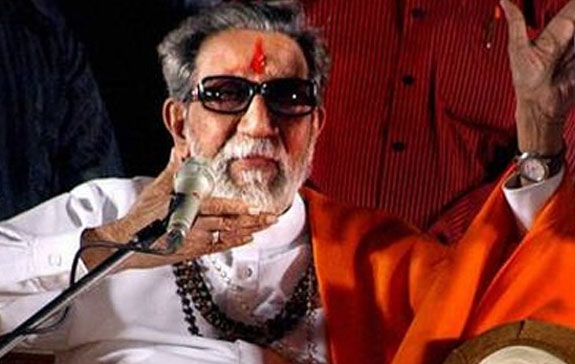Sala Who Will Not Learn: The Legacy Of Bal Thackeray
By Binu Karunakaran
19 November, 2012
Countercurrents.org
Perfection, of a kind, was what he was after,
And the poetry he invented was easy to understand;
He knew human folly like the back of his hand,
And was greatly interested in armies and fleets;
When he laughed, respectable senators burst with laughter,
And when he cried the little children died in the streets.
- Epitaph on a Tyrant , W.H. Auden
 Bal Thackeray once told an interviewer that the psyche of the Marathi manoos is to get anything for a lesser price, and if he gets it for free, it would be a tremendous success. It showed that Bal was very much the man who 'knew human folly like the back of his hand'. The nation paid a heavy price for the politics of divisiveness he propounded, but for lakhs of his ideological consumers, the shrillness of Bal-speak was easy on the pocket of intellect.
Bal Thackeray once told an interviewer that the psyche of the Marathi manoos is to get anything for a lesser price, and if he gets it for free, it would be a tremendous success. It showed that Bal was very much the man who 'knew human folly like the back of his hand'. The nation paid a heavy price for the politics of divisiveness he propounded, but for lakhs of his ideological consumers, the shrillness of Bal-speak was easy on the pocket of intellect.
No issue was complicated for him to explain, no solution was implausible. In the modern urban mythology of Mumbai the 'ubermensch' came riding a tiger. He loved when people bowed before him, the Saheb. Politicians and film stars wet themselves at the prospect of coming within the range of the phallic remote control he wielded. The media measured his rowdy rhetoric in gold. The militarist in him was more interested in building 'armies' of street fighters. Lathi-wielding sainiks ready to beat to pulp, the 'andu gundus' of South and the bhaiyas of Bihar, at the snap of his long 'artistic' fingers. A failed cartoonist's fingers to be exact. Fingers that were after a perfection of a different kind.
As a demagogue he knew there was little political risk in openly showing his admiration for Adolf Hitler. "Hitler did very cruel and ugly things. But he was an artist, I love him (for that). He had the power to carry the whole nation, the mob with him. You have to think what magic he had. He was a miracle.... The killing of Jews was wrong. But the good part about Hitler was that he was an artist. He was a daredevil. He had good qualities and bad. I may also have good qualities and bad ones," he once told an English daily. After all he was Fuhrer's cousin, distant and poorer. Another failed artist full of grandiose plans who dreamed of becoming a great painter. Did Bal harbour such delusions about his own artistic greatness and daredevilry?
Suketu Mehta sheds some light on Bal, the aspiring artist in his book on Mumbai - Maximum City. Young Bal's mother wanted him to be a government servant. But his father Keshav Sitaram Thackeray an activist-writer and social reformer who actively participated in the ‘Samyukta Maharashtra Andolan' had other plans: 'My son will never be a clerk. I want him to be an artist', he declared. 'When Father's order came, we wet our pants,' remembers Bal. The father bought a bulbul-tarang for little Bal, but he proved to be an inept musician. He tried and tried. But his fingers were not deft enough. His father was furious. He pressed his son's hand hard into the strings until it bled. 'I started crying, and my father said, "Get out from here! The sala will not learn.
His father changed tack and made him sketch every day by looking at political cartoons in the front page of Times of India. He learned the art of cartooning stroke by stroke mimicking Banbury and imbibed his father's son-of-soil politics from the meetings organised for the sake of Samyukta Maharashtra. The body of Thackeray junior became an extension of the political and artistic desires of his father. He continued towering over Bal, writing editorials for his publications and rendering political advice till he died in 1973.
Bal, the cartoonist, according to journalists who worked with him, was so timid that if the chair moved under him, he would get scared. How did the timid cartoonist metamorphose into a sharp-tongued tyrant-orator, who could at will, bring the country's financial hub to a standstill? The answer would perhaps lie in the Oedipal journey of Bal from his pant-wetting, stroke-tracing days under the shadow of his father, to the venerable Sarkar.
Binu Karunakaran is a Kochi based poet and journalist
Comments are moderated


